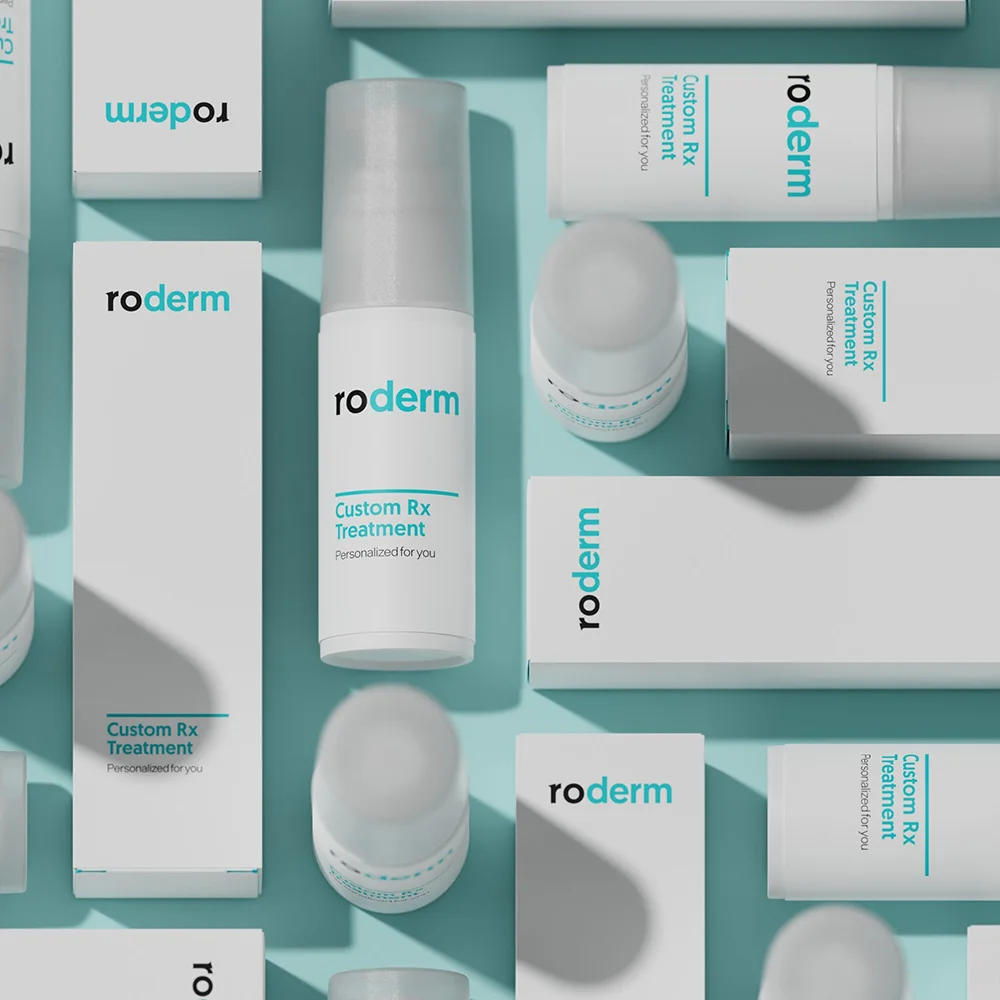Here's what we'll cover
Here's what we'll cover
Here's what we'll cover
Pop a pill for instantly smoother, more youthful skin—you know what they say: “If it sounds too good to be true, it probably is.” In the case of collagen for the skin, though, there’s some compelling evidence it might be useful. While the research doesn’t quite match up with the beauty magazines’ claims about collagen being a miraculous, age-defying elixir, this potential treatment is worth considering.
Let’s look at what collagen is, what it’s used for, and how it impacts the skin.
What is collagen for?
Collagen is an essential protein and part of your connective tissues, like skin, joints, tendons, and more. It is the most abundant protein in the body. Collagen provides the support structure for many of your body’s tissues. Because of this, using collagen supplements to help with skin, bone, hair, and joint health is increasing in popularity.
Collagen supplements are often from animal sources, like cow, pig, or marine animal tissues. Scientists have developed techniques to enable yeast and plant cells to create collagen. Still, due to cost and other factors, vegan collagen is not as widely available as animal-based collagen (Avila Rodríguez, 2017).
Supplements are available in pill and powder forms and can be taken alone or incorporated into smoothies or other foods. Collagen’s use worldwide continues to grow, with people spending billions of dollars on collagen products (Vollmer, 2018).
What does collagen do for your skin?
As you age, your body makes less collagen but continues to produce substances that break down collagen, called collagenases. You start to lose collagen around 18–29 years of age, and after age 40, you lose around 1% per year. By the time you reach 80 years old, your collagen production is only 25% as much as in young adults (Leon-Lopez, 2019).
When the skin loses collagen, it loses the structural framework that other cells need to make important compounds like elastin and hyaluronic acid (Vollmer, 2018). The common signs we see in aging skin, like fine lines and wrinkles, dryness, sagging, and loss of skin elasticity (the ability of your skin to snap back), are often due to loss of collagen.
Damage from sun exposure (called photoaging) also affects the collagen in the skin. Approximately 80% of facial skin aging is due to sun damage. Even sun exposure in childhood can change the appearance of aging skin later in life, leading to premature aging (Shanbhag, 2019).
When you expose your skin to the sun, the ultraviolet (UVA and UVB) rays cause DNA damage in skin cells, leading them to produce more compounds that break down collagen. Also, sun exposure can decrease the production of elastin, which is a compound needed to keep the skin firm and elastic (Shannbhag, 2019). People with photoaging have more aging signs than those who use regular sun protection from an early age.
Collagen benefits for the skin and body
Many of these health claims have limited data to support them, and more research in these areas is needed.
Anti-aging effects
Many “anti-aging” cosmetics target collagen in one way or another. Some include hydrolyzed collagen, which is collagen that has been broken down into smaller protein pieces (also called collagen peptides). Other collagen pills include the precursors (or building blocks) that your body can use to make more collagen. Still others include compounds that stimulate your skin cells to produce more collagen; some examples include vitamin C (ascorbic acid), alpha hydroxy acids (AHAs), and retinoids (tretinoin, retinol) (Baumann, 2018).
And it is not just cosmetics—many of the procedures used for anti-aging that your dermatologist may offer, like lasers or chemical peels, also work by stimulating collagen production. Often, an anti-aging treatment will involve some combination of options.
Since collagen is so vital in the skin aging process, there is ongoing research about how to incorporate collagen supplements into anti-aging treatments. Many animal studies have looked at how hydrolyzed collagen taken by mouth affects the skin. The research shows that oral collagen supplements can increase the health of skin collagen as well as improve skin dryness and inflammation (Vollmer, 2018).
Human research also suggests that supplementing with collagen may promote healthy skin. Several studies show that taking hydrolyzed collagen supplements by mouth improved skin elasticity, decreased the number of fine lines and wrinkles, caused smoother skin, increased skin hydration, and reduced the signs of facial skin aging (Vollmer, 2018).
More research is needed in the area of using collagen supplements for skin rejuvenation (making the skin look younger), but so far, the results are promising.
However, collagen supplementation is not a magic wand that will reverse the effects of time. Most likely, collagen supplementation may decrease the appearance of aging to some extent, potentially slow down the development of new wrinkles, and improve some of the other signs of skin aging.
Nail growth
Collagen is not only important for skin, but it also is a big part of your hair and nail health. Studies looking at collagen supplements suggest that they may improve nail appearance and strength. They also report stronger, glossier hair in those taking the supplements compared to those who took the placebo (Vollmer, 2018; Czajka, 2018).
Joint pain and function
Osteoarthritis (OA), or inflammation of the joints, is a common condition that tends to worsen with age. Oral collagen supplements may help improve joint pain and mobility in joint conditions like OA. One theory is that collagen supplements. The theory is that collagen supplements may decrease the inflammation in the joint and protect your joint cartilage. More research is needed, but collagen may be a helpful supplement for people with OA (Czajka, 2018).
Bone mineral density
Osteoperosis is a problem for older adults, especially in those who are postmenopausal. It is a condition where your bones lose calcium and weaken, making you more prone to fractures. One of the ways to measure osteoporosis is to look at bone mineral density. Studies suggest that taking collagen may help improve bone mineral density in postmenopausal women, thereby potentially decreasing their risk of developing osteoporosis (Konig, 2018).
Atherosclerosis
There is also some evidence that collagen supplements can affect your blood vessels and may help with the prevention and treatment of atherosclerosis, a significant cause of heart disease. Scientists theorize that collagen’s protective effects may be due to its ability to protect against the effects of oxidative stress (Saito-Takatsuji, 2021).
Types of collagen
Your body has around 28 different collagen types, depending on the tissue (hair, bone, skin, tendons, etc.). Collagen can be extracted from several sources, most often from bovine (cow), porcine (pig), and marine (fish) animal tissues.
You can take collagen dietary supplements by mouth, often in pill or powder form. Sometimes collagen powder is added to foods to improve stability or increase protein content (León-López, 2019). Bone broth is a popular way to consume collagen at home.
You will also see topical collagen creams or gels in the skincare industry. These are meant to be applied directly to the skin with the goal of fighting the signs of aging (Avila Rodríguez, 2017).
Scientists are continuing to study the aging process and learn more about potential options to slow the signs of aging. Collagen clearly plays an important role in aging. Taking collagen supplements may promote healthier, younger looking skin, while potentially benefiting your health in other ways. Talk to your healthcare provider about collagen supplements and whether they’re right for you.
DISCLAIMER
If you have any medical questions or concerns, please talk to your healthcare provider. The articles on Health Guide are underpinned by peer-reviewed research and information drawn from medical societies and governmental agencies. However, they are not a substitute for professional medical advice, diagnosis, or treatment.
References
Avila Rodríguez, M., Rodríguez Barroso, L., & Sánchez, M. (2017). Collagen: a review on its sources and potential cosmetic applications. Journal Of Cosmetic Dermatology , 17 (1), 20-26. doi: 10.1111/jocd.12450. Retrieved from https://pubmed.ncbi.nlm.nih.gov/29144022/
Baumann, L. (2018). How to use oral and topical cosmeceuticals to prevent and treat skin aging. Facial Plastic Surgery Clinics Of North America , 26 (4), 407-413. doi: 10.1016/j.fsc.2018.06.002. Retrieved from https://pubmed.ncbi.nlm.nih.gov/30213422/
Czajka, A., Kania, E. M., Genovese, L., Corbo, A., Merone, G., Luci, C., et al. (2018). Daily oral supplementation with collagen peptides combined with vitamins and other bioactive compounds improves skin elasticity and has a beneficial effect on joint and general wellbeing. Nutrition Research , 57 , 97–108. doi: 10.1016/j.nutres.2018.06.001. Retrieved from https://pubmed.ncbi.nlm.nih.gov/30122200/
König, D., Oesser, S., Scharla, S., Zdzieblik, D., & Gollhofer, A. (2018). Specific collagen peptides improve bone mineral density and bone markers in postmenopausal women—a randomized controlled study. Nutrients , 10 (1), 97. doi: 10.3390/nu10010097. Retrieved from https://www.ncbi.nlm.nih.gov/pmc/articles/PMC5793325/
León-López, A., Morales-Peñaloza, A., Martínez-Juárez, V., Vargas-Torres, A., Zeugolis, D., & Aguirre-Álvarez, G. (2019). Hydrolyzed collagen—sources and applications. Molecules , 24 (22), 4031. doi: 10.3390/molecules24224031. Retrieved from https://www.ncbi.nlm.nih.gov/pmc/articles/PMC6891674/
Shanbhag, S., Nayak, A., Narayan, R., & Nayak, U. Y. (2019). Anti-aging and sunscreens: paradigm shift in cosmetics. Advanced Pharmaceutical Bulletin, 9 (3), 348-359. doi:10.15171/apb.2019.042. Retrieved from https://pubmed.ncbi.nlm.nih.gov/31592127/
Saito-Takatsuji, H., Yoshitomi, Y., Ishigaki, Y., Yamamoto, S., Numata, N., Sakai, Y., et al. (2021). Protective effects of collagen tripeptides in human aortic endothelial cells by restoring ROS-induced transcriptional repression. Nutrients , 13 (7), 2226. doi: 10.3390/nu13072226. Retrieved from https://pubmed.ncbi.nlm.nih.gov/34209567/
Vollmer, D., West, V., & Lephart, E. (2018). Enhancing skin health: by oral administration of natural compounds and minerals with implications to the dermal microbiome. International Journal Of Molecular Sciences , 19 (10), 3059. doi: 10.3390/ijms19103059. Retrieved from https://www.ncbi.nlm.nih.gov/pmc/articles/PMC6213755/










